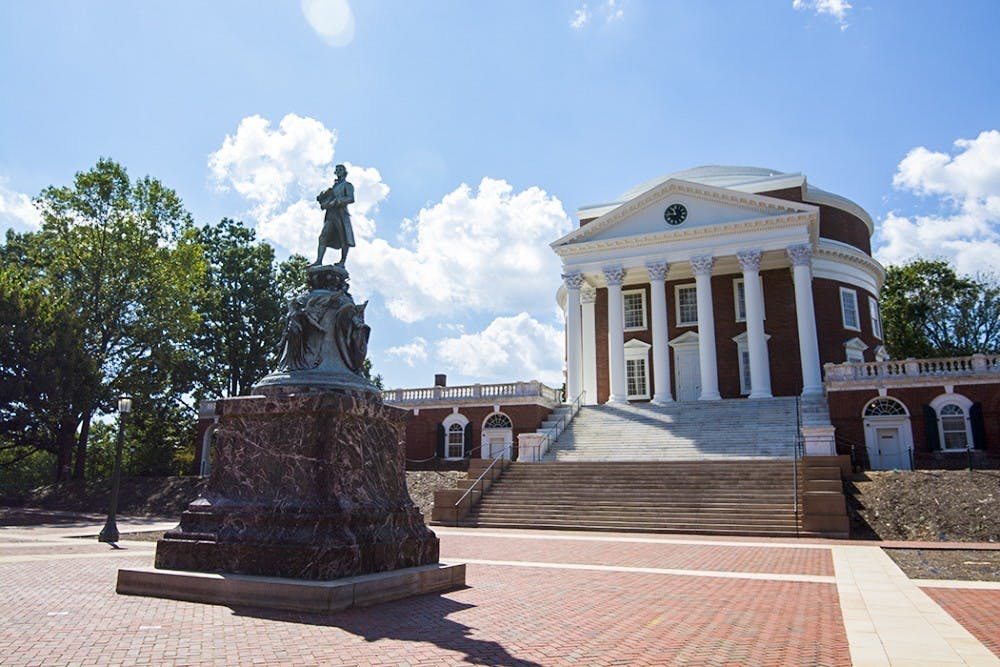It is probably no coincidence that I should come to write this piece just as it is beginning to truly feel like fall. Fall, of course, being the most aesthetically pleasing of the four seasons, has a way of bringing out the University’s beauty most spectacularly. The bright leaves settle on the lawn, and the cool, cloudless skies contrast brilliantly against the Rotunda. Admiring such things, however, comes with quite a bit of self-imposed baggage nowadays. One cannot take a tour of the University without learning of the central role of slavery in its construction. One cannot walk past the serpentine walls without imagining the forced laborers who once tended to the gardens. One cannot walk past the statue of Jefferson on the north side of the Rotunda without recalling how recently it was lit by the fire of tiki torches, or how Jefferson’s hands remain stained by a vandal’s red paint, as they have been for weeks now. There is a phrase which that I think well summarizes the palpable discomfort permeating every aspect of our University — “the personal is political.”
This phrase was popularized by feminist activist Carol Hanisch, though she does not claim to have come up with it.The idea of the wide-reaching societal consequences of one’s personal decisions and judgements can certainly be of value in diagnosing some of our ills and encouraging a sense of responsibility. Since Hanisch’s initial use of the phrase in 1969, this postmodern adage has grown in both the scope of its use and the breadth of its definition. History is political, entertainment is political and the political is — more than ever — very personal.
The problem with this relentless analysis and deconstruction lies in its proposed solutions — more specifically, the fact that there are none. It is is concerned only with critiquing the present, and does not consider the future in anything but the most vague terms. As a result, this sort of criticism leaves gaping cultural holes in its wake where there was once coherency. One can well acknowledge every single interpersonal, intersectional connection present in all aspects of life and society, however what can one do with such information? What are we left with? People resort to advocacy, to awareness-raising and to contextualization. None of these, however, present any coherent vision of our future as a society. Rather than being constructive, such movements are movements of reflection. They ask us to pause, to look backwards and try in vain to come to terms with the crimes and idiosyncrasies of our past. Such reflection can be valuable — necessary, even — to achieving progress. However, reflection is not sufficient to achieve progress. Criticism without purpose, without a clear and immediate vision for the future in mind, can only be destructive.
The fact is that it is impossible to ever completely come to terms with the cruelties of history. History is full of the most senseless suffering imaginable, of unnecessary and irrational violence and endemic ignorance. Our University is certainly no exception. Progress, however, consists of those precious nuggets of wisdom and truth that rise to the surface of that ethereal body of history. We should acknowledge that such advances are often borne of cruelty and freak chance, but for these very reasons we must hold on to them all the more dearly, for they are our rare respites from such suffering — glimpses at what mankind is truly capable of.
The question remains as to how one ought to feel walking around Grounds. One is constantly reminded of our history, at times admirable and at other times despicable. My advice would not be to block out and ignore that which makes us uncomfortable, but rather to draw on that which empowers us. The history of our University is one of both oppression and vision, and today it stands as an institution in which truth can be pursued as we see fit. We have stumbled into the present moment without grace or complete intent, yet here we are. Today, students are free to ask difficult questions and challenge norms, to advocate for causes and have their voices heard. Students of all backgrounds now reside in Lawn rooms, and lectures on hip-hop are given in The Rotunda. Problems and inequities certainly remain, but in many ways our history empowers us to address these issues. Here, it is our obligation to “follow truth wherever it may lead.”
Fall is finally upon us, and soon the University will assume its most spectacular form. As we walk around Grounds, we should not feel guilty when soaking in the spectacle. Feel free to wallow a bit, to be inspired to use this institution to your advantage in spite of its history. Our past is complex and contradictory, much like our founder’s. Today, however, this University stands as an indispensable tool in the pursuit of truth and justice, and one shouldn’t deny oneself the pleasure of taking it all in this fall.
Ben Burke is a Viewpoint writer for The Cavalier Daily. He can be reached at opinion@cavalierdaily.com.







